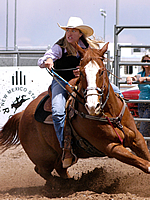
Mann, JuneAboutLife on the family farm that employed POWs during World War II
Abstract
Tape 1, Side A
Father's farm, located at 2407 Rio Grande Boulevard was within the county limits at that time. The farm consisted of one hundred acres, with seven acres planted as fruit orchard. Crops grown prior to, and during WWII included apples, peaches, cherries, lettuce, tomatoes, strawberries, cabbage, and celery. Celery was shipped to the White House, and other produce was sold in specialty stores but not in large food market chains. Her father employed twenty German POWs every other day. These workers were shared with the Simms' and also shared with the Ishman's vineyard in Corrales. Japanese farmers had been relocated to internment camps. The consultant recalls that each German had a specialty. One of the POWs grafted Bing cherries onto sour pie cherries, thus making the pie cherries larger and sweeter. She recalls that the POWs did every kind of work, and were "good, hard workers." One guard came with the POWs and the Captain of the camp would drive over to check on the prisoners. The POWs did not like anything that was black in color. This was Hitler's color, and they didn't approve of Hitler. The POWs came to work with only a peanut butter sandwich. The consultant's mother felt that the sandwich was not enough to sustain workingmen, so she began to cook them a nice meal every day. POWs rarely ran off, even from the camp. When the POWs left New Mexico, they went to England. Ms. Mann recalls that they received letters and pictures from some of the POWs, and one even called from German. The consultant discusses family history. Conversation continues regarding POWs that had worked on the family farm. Sigfried Rogge, one of the POWs continued to correspond, exchange Christmas gifts and exchange family photos. In the period of time before the war, her father used an average of thirty-five Spanish workers. During the war, extra workers were needed, thus prompting the use of POWs. After the POWs returned to Europe, her father primarily raised alfalfa, and maintained the orchard. She recalls that eleven acres were planted in strawberries. After the POWs left in mid season, the Mann children picked berries and were paid one cent per pint. When the POWs were working on the farm, they came every other day year-round. The camp was located at Schwartzman's. Clyde Tingley was upset about the German POWs being located in the area. Although the children were not apprehensive of the POWs, they were not allowed to get too close to them.
Tape 1, Side B
The consultant discusses the history of her siblings and talks about her own graduation from Albuquerque High School. She recalls that her mother instructed the POWs in German, and that the POWs spoke quite good English. The guard often took naps in the living room while the POWs worked. Some POWs were not permitted to work on farms because they were too much of a risk. The POWs ran the tractors, watered (farm had Rio Grande Conservation ditch rights), trimmed the orchard trees and basically "did everything." POWs were well treated and there were no problems at work. She recalls that among the six sisters, not one of them was frightened of the prisoners. Pictures from Sigfried Rogge are discussed. One photo shows his children playing with a train "from Grandma in America," signed on the back. The farm history, and how her father obtained it is discussed. The farm was purchased from the Catholic Church, having been "confiscated by the church as payment for funerals." The consultant's father was a merchant with no prior farming experience. His family had operated a family mercantile store for seventy-five years. Ms. Mann's six sisters are presently scattered in California, Colorado, New Mexico and Arizona. Her father died in 1970, and per the provisions of the will, the farm was sold. Homes were built on the farm site, and the "nice homes" are very expensive today. In the final years of farm operation, her father grew alfalfa and ran the orchard. He built a Quonset hut on Rio Grande Blvd., and had a filling station and branch of the Post Office. The farm was located within city limits at that time, and was considered valuable property. At one point, her father raised approximately one hundred pigs, until feed restrictions were enacted. These pigs were County Agent inspected to ensure that there was "no swill." The topic of POWs was never discussed in school. She recalls that her father brought first and second graders to the farm for a field trip once a year.
Tape 2, Side A
The tape begins with a discussion of the consultant's parents. Her father, Charles, was born in New Mexico and her mother, Beatrice, was born in Missouri. Her father spoke fluent Spanish and had close ties with the "Spanish people." Her father was nicknamed "Tootsie." Her father learned how to farm from books, talking to other people, and states that the County Agent was a good mentor. Her father helped to organize and create the Rio Grande Conservancy. As a child, Ms. Mann was active in 4-H activities, the State Fair, and had a good childhood. She recalls that they used electric milking machines on the cows. The cows were only for family use although her mother did sell the butter. The Thatcher family that lived next door had a dairy. Her schooling is discussed. She recalls that the Simms family donated property to the Albuquerque Academy. Dr. Simms (who was a "gentleman farmer") made house calls. Simms and Dietz both employed POWs. The big, yellow house owned by the Dietz family is still there. They were a well-to-do family that made Dietz lanterns. Mr. Bob Dietz was a potato farmer. The interview is concluded with a discussion of the consultant's employment at Angel Fire. |

